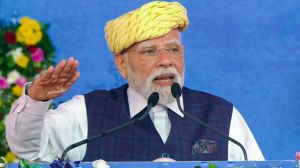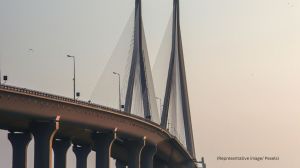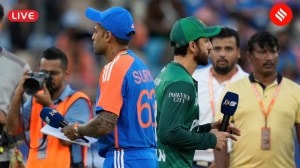Bystander grabs games torch in Melbourne street
Melbourne, August 7: A bystander ran into the road and snatched the Olympic torch from the relay runner carrying it through the streets of...

Melbourne, August 7: A bystander ran into the road and snatched the Olympic torch from the relay runner carrying it through the streets of Melbourne on Monday.
Security guards and police immediately grabbed the man and handed the torch back to the runner, a school receptionist.
“Someone had a bit of a prank,” a torch relay spokesman said. “Someone came out from the crowd, grabbed the torch and then they were grabbed. It was all over in a few seconds.”
The man was taken away by police and may be charged, the spokesman said.
A police spokesman said: “it happened so quickly that most people wouldn’t have been aware what had happened.”
protest plans
SYDNEY Among the many protest groups gearing up to make their mark during next month’s Sydney Olympics there is an overwhelming favourite.
From anti-capitalists to environmentalists, from tradeunions to lesser known demonstrators such as people ingeniously subverting the Sydney Olympic farce (pissoff), the team they all want to win is Australia’s aborigines.
Indeed, some groups plan to deliberately downplay their own protests so the spotlight remains on aborigine demonstrations during the September 15 to October 1 games.
The student group campaign against corporate tyranny inunity and solidarity (Cactus) has been waging a local campaign against Nike and other games sponsors Mcdonald’s and Coca-cola, but plans to join indigenous rights protesters outside the opening ceremony.
“It’s generally seen (that) the Olympics belongs to the aboriginal activists and no one wants to compete with them for media attention. We’ll try and get our message out, but not in a big fancy way,” Cactus member Jesse Wynhausen told newsmen. “But there might be a few surprise actions here and there,” he said.
Security around Sydney and the Olympic sites will be extra tough as authorities go on the alert for everything from fundamentalist terrorist attacks to hostage-taking to naked streakers.
Bussing demonstrators from around the country, protest 2000 reckons up to 20,000 aboriginals will be marching daily to the Olympic Stadium, their numbers swollen by non-indigenous supporters.
“We’ve got representatives from every tribe coming to the protest and there are about 500 tribes in Australia,” Trevor Close, protest 2000 organiser and president of the United Githabul Tribal Nation Aboriginal Inc told newsmen.
China rejects
BEIJING: The Chinese Athletics Federation on Monday turned down walker Chen Yueling’s request to participate at the Sydney Olympic games for the United States. A Federation spokesman said the Chinese emigrant Chen has not had an American passport long enough – as stated in Olympic regulations.
Chen has been a US citizen for two years. IOC rules state however that an athlete must be a citizen for at least three years to start for their new nation unless the native country gives its approval.
China denied accusations that they feared Chen would perform better than Chinese walkers. “Chen is no threat for China. The fact that she is not participating makes no difference to us,” the spokesman said.
Excellent telecast promised
SYDNEY: Next month’s Sydney Olympics are going to involve the biggest telecast in history with more than 800 cameras whirring at 35 competition venues for a record 19 days.
It’s also going to mean top-notch camera work, says Gary Fenton, head of the Sydney Olympic Broadcasting Organisation (SOBO).
“We’ll have everything they did in Atlanta, and then some,” Fenton promises, keenly aware that fellow broadcasting professionals are expecting unparalleled whizz-bang stuff from SOBO’s scratch team.
Take the trackside camera which, in Atlanta, kept up with sprinters to give viewers the sensation they were running alongside the fastest people on earth.
In Sydney, the length of the rail for the tracking camera has been extended from Atlanta’s 100 metres to almost the whole way round the 400-metre oval.
To deliver on a promise of visual excellence, you need an up-to-the-minute studio. SOBO will work out of the international broadcast centre, the central node of a brand-new system with 4,800 kilometres of optical fibre, 30,000 phone and fax lines, 3,200 audio links, 280 video links, the capacity for 60 private cable TV channels and reception for 15,000 mobile phones.
SOBO’s job is to deliver footage to the broadcasters who will bring the games to a World audience, including NBC, the US Network that paid 715 million US dollars to be chief rights holder.
Ferreira, Coetzer in hunt
JOHANNESBURG: South Africa sent Wayne Ferreira and Amanda Coetzer in search of Olympic tennis gold when they were named on Monday for their third games.
Ferreira won silver in the doubles with Pietie Norval at the Barcelona Olympics eight years ago on South Africa’s return to World sport after the dismantling of apartheid. This time Ferreira will contest only the singles, but Coetzer is to play both singles and doubles, the latter with Mariaan de Swardt.
The men’s doubles hopes will be on the shoulders of the country’s potent Davis Cup pairing of David Adams and John-Laffnie de Jager, who are unbeaten as a combination in the competition.
No rain
Olympic organisers on Monday swept aside fears that seasonal spring rains could dampen hopes for athletics records at the Sydney Games.
“The warm, clear days will draw Sydney siders outdoors and the sunny and temperate climate will combine with the World- standard facilities to speed athletes to their best performance,” a spokesman for the Sydney Organising Committee for the Olympic Games (SOCOG) said.
But even if it stays dry, with track and field finals to be held on cool Spring evenings, there is unlikely to be a rush on World records like that seen at Atlanta on hot, balmy nights in August 1996.
Some pundits are predicting only the gold medallist in the men’s 100 metres will run under the magical 10-second barrier.
And even International Olympic Committee President Juan Antonio Samaranch says he fears Sydney’s unpredictable September climate.
Samaranch hopeful
SEVILLE, (SPAIN): Olympic supremo Juan Antonio Samaranch is convinced that the Sydney summer games next month will be an allout success and that the local officials will come to grips with the organising hiccups of the last days and weeks.
Samaranch said in an interview with Deutsche Presse-Agentur the congress of the World Volleyball Federation in the southern Spanish city that the go-ahead for blood tests for the wonder drug EPO at the September 15-October 1 Olympics was also a big success.
Aboriginal art centre to be closed
SYDNEY: Sydney’s Olympic authorities said on Monday that they could close an aboriginal arts centre immediately outside the main stadium if it was used as a focus for protests to highlight the plight of the country’s aborigines.
In a decision likely to set off a storm of protests by civil liberty groups around the World, Sydney 2000 games organisers said the arts centre at the main Olympic park was bound contractually not to organise or encourage protests at the site.
“No one is saying you can’t protest, it’s a case of where you can protest is more the issue,” said Graham Cassidy, a spokesman for Sydney Games Organising Committee president Michael Knight.
Photos



- 01
- 02
- 03
- 04
- 05




























